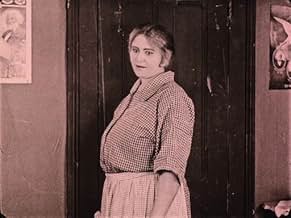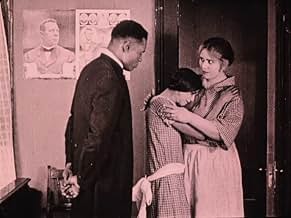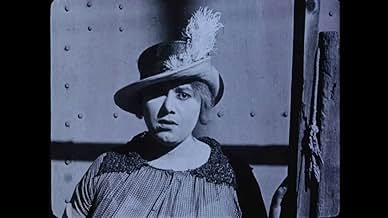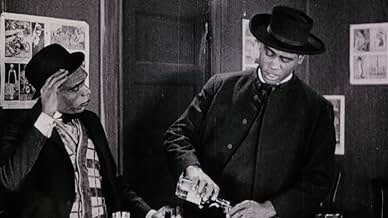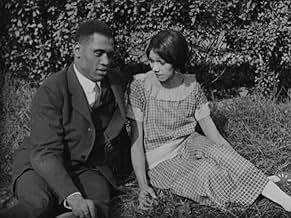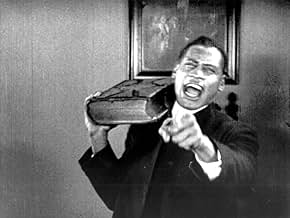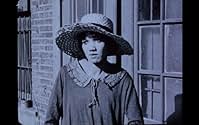IMDb-BEWERTUNG
6,2/10
1277
IHRE BEWERTUNG
Füge eine Handlung in deiner Sprache hinzuA malevolent phony preacher plots to take advantage of a woman from his congregation who happens to be in love with his long-estranged identical twin brother.A malevolent phony preacher plots to take advantage of a woman from his congregation who happens to be in love with his long-estranged identical twin brother.A malevolent phony preacher plots to take advantage of a woman from his congregation who happens to be in love with his long-estranged identical twin brother.
- Auszeichnungen
- 1 wins total
Marshall Rogers
- Speakeasy Proprietor
- (as Marshall Rodgers)
Mercedes Gilbert
- Martha Jane - Her Mother
- (Nicht genannt)
Julia Theresa Russell
- Isabelle - the Girl
- (Nicht genannt)
Empfohlene Bewertungen
Two escaped fugitives bring ruin to an African-American community. One passes himself off as Rev. Isaiah T. Jenkins (Paul Robeson) and the other is his cellmate Yello-Curley' Hinds. The fake reverend corrupts a member of his congregation, Isabelle Perkins, who happens to love Sylvester, Jenkins' long-lost identical twin brother.
First, I don't like some of the text which tries to use colloquial black speech. It's downgrading but also makes it harder to understand. Maybe the black audience of the day feels more comfortable with that. This is to be black cinema made for a black audience. I'm willing to accept it for what it is. On the other hand, I don't think some of the plot points make sense.
The mother wouldn't buy Sylvester revealing himself as a reverend right after telling her daughter to find herself a reverend. The mother would assume that the young couple is faking it. I also don't think the twin brother idea works in this plot. Apparently, this movie was chopped up to satisfy the censors and maybe the longer version functions better. The main aspect that really works is the great Paul Robeson. He is the magnetic lead and he delivers compelling performances.
First, I don't like some of the text which tries to use colloquial black speech. It's downgrading but also makes it harder to understand. Maybe the black audience of the day feels more comfortable with that. This is to be black cinema made for a black audience. I'm willing to accept it for what it is. On the other hand, I don't think some of the plot points make sense.
The mother wouldn't buy Sylvester revealing himself as a reverend right after telling her daughter to find herself a reverend. The mother would assume that the young couple is faking it. I also don't think the twin brother idea works in this plot. Apparently, this movie was chopped up to satisfy the censors and maybe the longer version functions better. The main aspect that really works is the great Paul Robeson. He is the magnetic lead and he delivers compelling performances.
Of course, we will never have a chance to see a director's cut of Body and Soul. Were that possible, then we would certainly see a completely different movie.
Many of the obvious flaws in the film were due to Oscar Micheaux's difficulties in getting the production past the censors. Despite the fact that the convict is acting as a minister, the act of showing one in a minister's robes drinking was too much for the time.
Today it would be a matter of getting several million dollars from the studio and re-shooting sections of the movie. Oscar Micheaux did not have this luxury. This meant that he had to use the little money available to him to change a completely unacceptable movie into one that would help pay the bills.
The only way to do this was to add an ending that corrected everything, and cut the sections of drinking, which happened to be crucial to the story. This resulted not only in a lack of explanation for the story and very clumsy movements from one scene to the next.
The drinking scenes have been replaced, which lengthens the film to eight of its original nine reels. This certainly helps, but the alternative ending remains. I am thinking that the director's cut would not have included this and Oscar Micheaux would have a much better movie.
Of course, Paul Robeson drives this movie (his only silent appearance), and moviegoers now know of his brilliant voice. Sans this, his penetrating eyes showed the emotion that must have matched his stage performances, which makes this a movie that can be recommended.
Many of the obvious flaws in the film were due to Oscar Micheaux's difficulties in getting the production past the censors. Despite the fact that the convict is acting as a minister, the act of showing one in a minister's robes drinking was too much for the time.
Today it would be a matter of getting several million dollars from the studio and re-shooting sections of the movie. Oscar Micheaux did not have this luxury. This meant that he had to use the little money available to him to change a completely unacceptable movie into one that would help pay the bills.
The only way to do this was to add an ending that corrected everything, and cut the sections of drinking, which happened to be crucial to the story. This resulted not only in a lack of explanation for the story and very clumsy movements from one scene to the next.
The drinking scenes have been replaced, which lengthens the film to eight of its original nine reels. This certainly helps, but the alternative ending remains. I am thinking that the director's cut would not have included this and Oscar Micheaux would have a much better movie.
Of course, Paul Robeson drives this movie (his only silent appearance), and moviegoers now know of his brilliant voice. Sans this, his penetrating eyes showed the emotion that must have matched his stage performances, which makes this a movie that can be recommended.
I learned of Oscar Micheaux from Melvin Van Peebles's documentary "Classified X", about the history of cinema produced and directed by African-Americans. I recently saw Micheaux's "Veiled Aristocrats", and have now seen his "Body and Soul".
For the most part, it's a good movie, with Paul Robeson playing a con artist posing as a clergyman. However, there's one thing that's grating about it, and this might just be a 21st-century view of it: the dialogue on the intertitles. It sounds like stereotyped depictions of African-Americans. Maybe Micheaux was writing the actors' actual dialects, but to me it sounded like it came from a minstrel show. On that subject, after Willie Mays died recently, Keith Olbermann recalled a phone that he'd had with Mays, where Mays affected what sounded like a minstrel show voice (Olbermann didn't imitate it, noting that for a white person to do so would sound incredibly racist).
Anyway, it's an okay movie on its own, with fine performances all around. Just remember that the dialogue on the intertitles sounds cringey nowadays.
For the most part, it's a good movie, with Paul Robeson playing a con artist posing as a clergyman. However, there's one thing that's grating about it, and this might just be a 21st-century view of it: the dialogue on the intertitles. It sounds like stereotyped depictions of African-Americans. Maybe Micheaux was writing the actors' actual dialects, but to me it sounded like it came from a minstrel show. On that subject, after Willie Mays died recently, Keith Olbermann recalled a phone that he'd had with Mays, where Mays affected what sounded like a minstrel show voice (Olbermann didn't imitate it, noting that for a white person to do so would sound incredibly racist).
Anyway, it's an okay movie on its own, with fine performances all around. Just remember that the dialogue on the intertitles sounds cringey nowadays.
A very moving film for its time.I'm a big Paul Robeson fan and I'm glad TCM shows a lot of films with all Black casts.I think it should be shown along with the 1929 film "Hallelujah".It also has an all Black cast and has religion as its theme but it's not a silent film.This film ran a little too long but I never stopped watching.Touchy subject matter even today.Right on point even today!Even though Robeson found fame who knows what talent the others had that skin color stopped from them also becoming well known.That's why I love these films.The Black Church must have shunned this type of film back them and the actors couldn't have had an easy time of it.I'd call this a silent soap opera.The mother really loved her daughter a whole lot.Mercy!The daughter was the ultimate tragic figure.The Minister.One word-Sinister!
Body and Soul (1925)
*** (out of 4)
Paul Robeson plays a really sinister con man who will dip to any level to get what he wants. He pretends to be a Reverend and soon he sets his eyes on the good girl Isabelle (Mercedes Gilbert). At first her and her mother just see him as a kind-hearted preacher but soon the daughter realizes his evil ways include trying to steal her life savings.
Director Oscar Micheaux had already made several movies but there's no question that this here was going to be his epic. Robeson was already well-known on the stage so the two of them teaming up seemed like a grand idea but apparently the two men fought for most of the shooting time and apparently they hated each other so much that Robeson wouldn't even discuss this film. It's also said that the original version was much darker but the director was forced to cut it down by several reels, which is really too bad.
As it stands, BODY AND SOUL is a very impressive movie and it's really shocking at how well it turned out and especially when you consider that the budget was very low and of course there was the behind-the-scenes issues. There's no question that the greatest thing about the picture is the performance by Robeson who really does do a terrific job at coming off as this holy man. He certainly makes you believe this fake side of his character and it's easy to see why someone would fall for him. The actor also perfectly nails the more sinister side of the character.
The film looks very good, again, for its budget and the editing is also good. The entire movie looks very professional, which wasn't always the case for these early race movies. I'd also argue that the story itself was quite good and it really wasn't too often that you'd see any movie taking a look at religious figures in a negative way. BODY AND SOUL is certainly another winning film from the director and a great start for Robeson.
*** (out of 4)
Paul Robeson plays a really sinister con man who will dip to any level to get what he wants. He pretends to be a Reverend and soon he sets his eyes on the good girl Isabelle (Mercedes Gilbert). At first her and her mother just see him as a kind-hearted preacher but soon the daughter realizes his evil ways include trying to steal her life savings.
Director Oscar Micheaux had already made several movies but there's no question that this here was going to be his epic. Robeson was already well-known on the stage so the two of them teaming up seemed like a grand idea but apparently the two men fought for most of the shooting time and apparently they hated each other so much that Robeson wouldn't even discuss this film. It's also said that the original version was much darker but the director was forced to cut it down by several reels, which is really too bad.
As it stands, BODY AND SOUL is a very impressive movie and it's really shocking at how well it turned out and especially when you consider that the budget was very low and of course there was the behind-the-scenes issues. There's no question that the greatest thing about the picture is the performance by Robeson who really does do a terrific job at coming off as this holy man. He certainly makes you believe this fake side of his character and it's easy to see why someone would fall for him. The actor also perfectly nails the more sinister side of the character.
The film looks very good, again, for its budget and the editing is also good. The entire movie looks very professional, which wasn't always the case for these early race movies. I'd also argue that the story itself was quite good and it really wasn't too often that you'd see any movie taking a look at religious figures in a negative way. BODY AND SOUL is certainly another winning film from the director and a great start for Robeson.
Wusstest du schon
- WissenswertesFilm debut of Paul Robeson.
- PatzerMother Martha Jane looks through her Bible for the saved money to show it to the sisters, but it's missing. She leaves the book on the table and while searching through some drawers, three shots of the sisters show no book on the table. When the mother returns to the table, the book is back.
- Zitate
Yello-Curley' Hinds - the Phony Reverend's Former Jailmate: I tell you that I was not seekin' you out, but dropped off here to find girls for 'Cotton Blossom's Shoulder Shakers' - - and this little Isabelle - - she appeals to muh!
- Alternative VersionenRaymond Rohauer, Inc. copyrighted a restored version in 1979 with a music track and new credits. The music was composed and performed by Lee Erwin and was recorded at Carnegie Hall Cinema, New York. It's running time is 83 minutes.
- VerbindungenFeatured in Black Shadows on a Silver Screen (1975)
Top-Auswahl
Melde dich zum Bewerten an und greife auf die Watchlist für personalisierte Empfehlungen zu.
- How long is Body and Soul?Powered by Alexa
Details
- Laufzeit
- 1 Std. 42 Min.(102 min)
- Sound-Mix
- Seitenverhältnis
- 1.33 : 1
Zu dieser Seite beitragen
Bearbeitung vorschlagen oder fehlenden Inhalt hinzufügen

